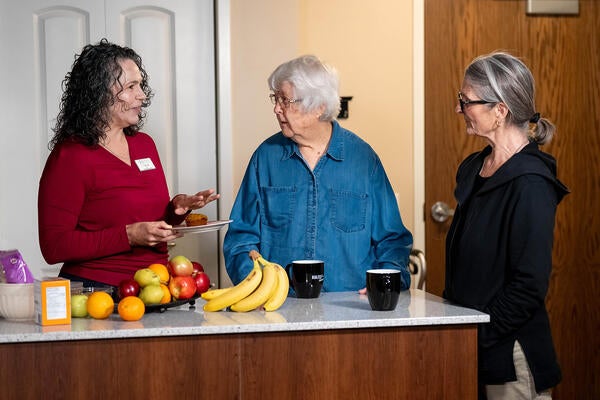
New approach to advance care planning preferred by Canadian long-term care residents
Sixty per cent of long-term care homes are not routinely involving residents in end-of-life care discussions

Sixty per cent of long-term care homes are not routinely involving residents in end-of-life care discussions
By Media RelationsResearchers have developed a better way to support end-of-life planning in long-term care homes, according to a recent study.
The researchers also found that only 40 per cent of homes were routinely involving residents in end-of-life care discussions.
“Often people assume that a non-capable resident can’t participate, but there are other ways of communicating and understanding an individual’s preferences,” said George Heckman, a researcher in Waterloo’s School of Public Health Sciences and Schlegel Research Chair with the Schlegel-UW Research Institute for Aging.
The new approach to support end-of-life planning, Better tArgeting, Better outcomes for frail ELderly patients (BABEL), was found to be much more comprehensive than the usual manner in which long-term care homes conduct advance care planning.
The BABEL approach, developed by researchers at the Universities of Waterloo, Manitoba and Calgary, uses a tailored, person-centred approach based on best practices, and was designed with stakeholder input. BABEL was tested in 29 long-term care homes in three provinces: Ontario, Manitoba and Alberta.
Advance care planning is a critical process that ensures individuals’ values, wishes and preferences are understood and honoured at the end of life. BABEL achieves that by involving residents as active participants and putting their values and wishes first. Since it is hard for individuals to think about hypotheticals, the care team focuses on situations most likely to happen to a resident and how outcomes of different treatments might align with their individual goals.
“It’s a conversation that needs to happen often, as health status changes, and it involves residents, family members and the care team,” Heckman said. “As a physician, I know how important care at end of life is for individuals and their families, and this is an opportunity to get this right. BABEL certainly seems to help residents and substitute decision-makers with these otherwise challenging conversations and paves the way for more timely and comprehensive palliative care.”
Residents who participated in BABEL also avoided unhelpful and potentially harmful treatments at end of life. “Reducing the use of unnecessary treatments is often preferred at the end of life when comfort becomes a higher priority,” Heckman said.
“Reducing the unnecessary use of antibiotics in care settings also has broader benefits, given its current overuse.” The study found that lower use of antibiotics in participating residents did not impact survival.
The study, detailing the researchers’ findings, was authored by Heckman, the University of Manitoba’s Allan Garland and a team of Canadian researchers. It was published in the journal Age and Ageing. The research was funded by the Canadian Frailty Network and Research Manitoba.

Read more
The Government of Canada announces funding to support research in food policies and medical devices

Read more
How machine learning empowers collaboration between computer science, math and medical research

Read more
Dr. Heather Keller discusses the need to transform mealtimes in Canada’s long-term care homes from a service to a meaningful form of care
The University of Waterloo acknowledges that much of our work takes place on the traditional territory of the Neutral, Anishinaabeg, and Haudenosaunee peoples. Our main campus is situated on the Haldimand Tract, the land granted to the Six Nations that includes six miles on each side of the Grand River. Our active work toward reconciliation takes place across our campuses through research, learning, teaching, and community building, and is co-ordinated within the Office of Indigenous Relations.